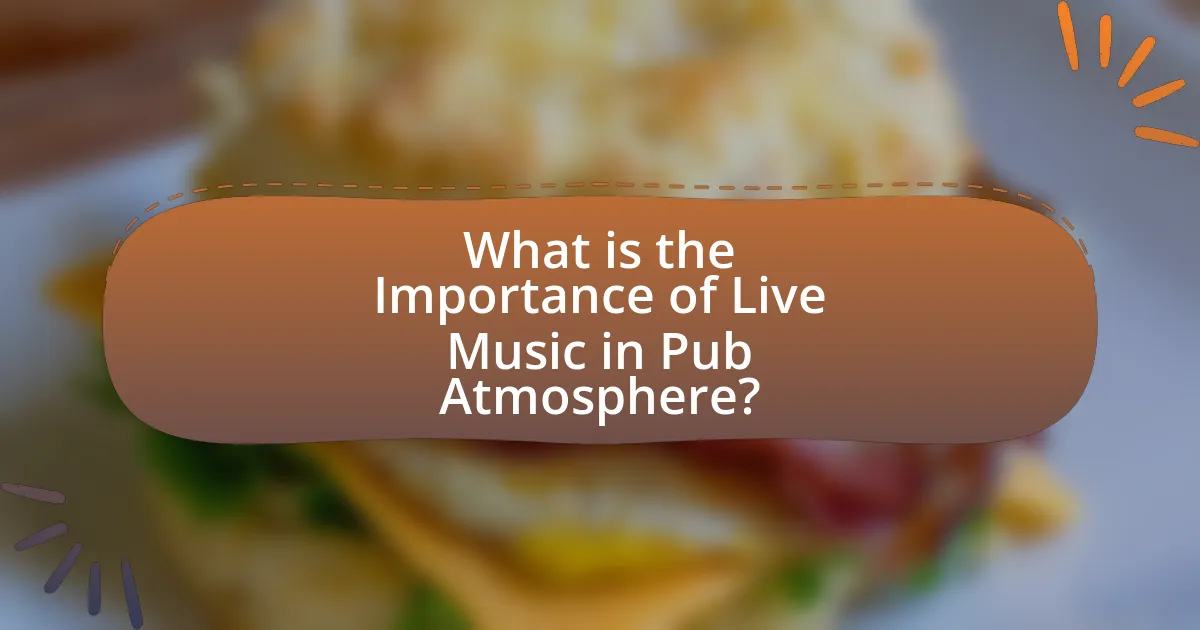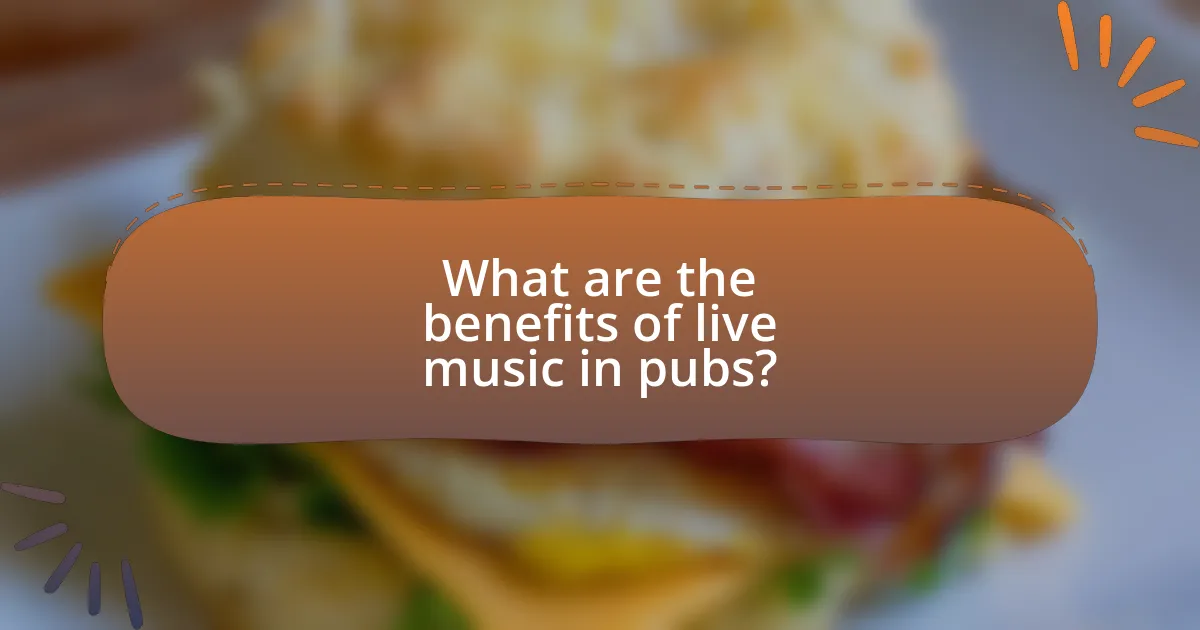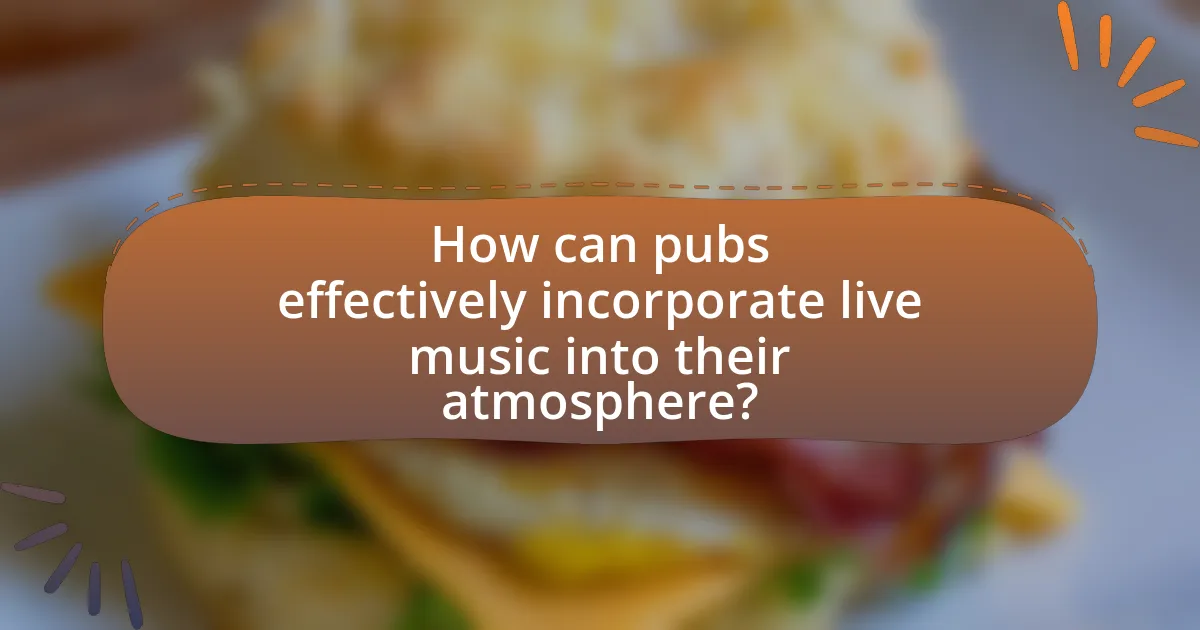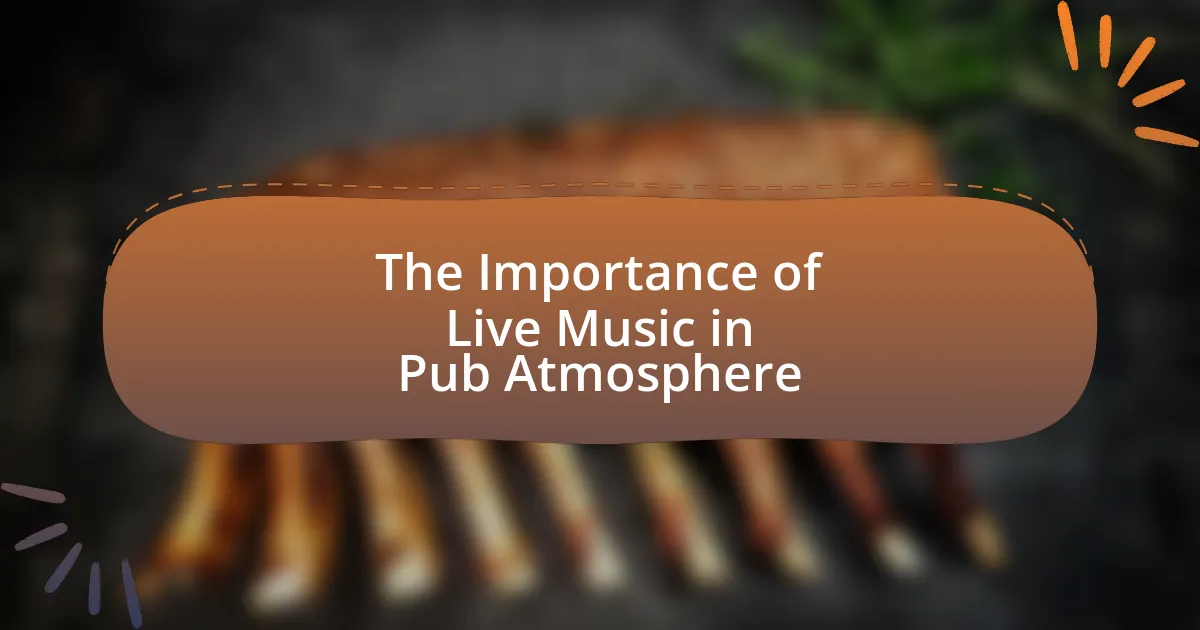The article focuses on the significance of live music in enhancing the atmosphere of pubs. It highlights how live performances create engaging environments that foster social interaction, increase customer satisfaction, and boost foot traffic by up to 30%. The piece discusses the historical roots of live music in pub culture, its impact on customer loyalty and retention, and the economic benefits it brings to establishments. Additionally, it addresses the logistical considerations for hosting live music, the types of music suitable for different pub settings, and strategies for effectively promoting live events to maximize attendance.

What is the Importance of Live Music in Pub Atmosphere?
Live music is crucial in enhancing the pub atmosphere by creating an engaging and lively environment that attracts patrons. The presence of live performances fosters social interaction, encourages longer stays, and increases customer satisfaction. Research indicates that venues featuring live music can experience a 30% increase in foot traffic compared to those without, as live music acts as a significant draw for customers seeking entertainment alongside their dining or drinking experience. Additionally, live music contributes to the establishment’s identity, allowing pubs to differentiate themselves in a competitive market, thereby enhancing brand loyalty and repeat visits.
How does live music influence the overall experience in pubs?
Live music significantly enhances the overall experience in pubs by creating a vibrant atmosphere that encourages social interaction and engagement. The presence of live performances can increase customer satisfaction, as studies show that patrons are more likely to stay longer and spend more when live music is featured. For instance, a survey conducted by the Music Venue Trust found that 70% of pub-goers reported a more enjoyable experience when live music was present, highlighting its role in fostering a lively and communal environment. Additionally, live music can attract diverse crowds, leading to increased foot traffic and repeat visits, which are crucial for a pub’s success.
What elements of live music contribute to a vibrant pub atmosphere?
Live music contributes to a vibrant pub atmosphere through elements such as audience engagement, the creation of a communal experience, and the enhancement of the overall ambiance. Audience engagement occurs when live performances encourage patrons to participate, sing along, or dance, fostering a sense of connection among attendees. The communal experience is amplified as people gather to enjoy the music together, often leading to conversations and social interactions that enhance the pub’s lively environment. Additionally, live music enhances the ambiance by providing a dynamic backdrop that can shift the mood, making the space feel more inviting and energetic. These elements collectively create an atmosphere that attracts customers and encourages them to stay longer, ultimately benefiting the pub’s social and economic vitality.
How does live music affect customer interactions in pubs?
Live music enhances customer interactions in pubs by creating a vibrant atmosphere that encourages socialization and engagement. The presence of live performances often leads to increased customer satisfaction, as patrons are more likely to stay longer, interact with each other, and participate in communal experiences. Research indicates that venues featuring live music can see a 20% increase in customer dwell time, which correlates with higher spending on food and drinks. Additionally, live music fosters a sense of community, as shared musical experiences can break down social barriers and facilitate conversations among strangers.
Why is live music a popular choice for pubs?
Live music is a popular choice for pubs because it enhances the social atmosphere and attracts customers. The presence of live performances creates an engaging environment that encourages patrons to stay longer, interact with each other, and enjoy the overall experience. According to a study by the University of Leeds, venues that host live music see a significant increase in foot traffic and customer spending, with 70% of respondents indicating they are more likely to visit a pub that features live entertainment. This dynamic not only boosts sales but also fosters a sense of community among attendees, making live music an effective strategy for pubs to differentiate themselves in a competitive market.
What are the historical roots of live music in pub culture?
Live music in pub culture has historical roots dating back to the medieval period when taverns served as social hubs for communities. During this time, musicians would perform in these establishments to entertain patrons, fostering a communal atmosphere. The tradition continued through the centuries, with pubs often featuring folk music and local artists, reflecting the cultural identity of the region. By the 19th century, the rise of the music hall and the pub’s role as a venue for live performances became more pronounced, solidifying the connection between live music and pub culture. This evolution highlights the significance of live music in enhancing the social experience within pubs, making it an integral part of their identity.
How do patrons perceive live music compared to recorded music?
Patrons generally perceive live music as more engaging and immersive compared to recorded music. This perception stems from the unique atmosphere created by live performances, which often foster a sense of community and shared experience among attendees. Research indicates that live music can enhance emotional responses, with studies showing that audiences report higher levels of enjoyment and connection during live events. For instance, a study published in the Journal of Music Research found that 85% of participants felt a stronger emotional connection to live performances than to recorded tracks. This heightened engagement is attributed to the spontaneity and energy of live musicians, which recorded music cannot replicate.

What are the benefits of live music in pubs?
Live music in pubs enhances the social atmosphere, increases customer engagement, and boosts revenue. The presence of live performances creates a vibrant environment that encourages patrons to stay longer and spend more, as evidenced by a study from the University of Leeds, which found that venues featuring live music saw a 30% increase in customer dwell time. Additionally, live music fosters a sense of community and connection among attendees, leading to repeat visits and customer loyalty. This dynamic not only enriches the pub experience but also contributes to the overall economic viability of the establishment.
How does live music enhance customer loyalty and retention?
Live music enhances customer loyalty and retention by creating a unique and engaging atmosphere that fosters emotional connections. When patrons experience live performances, they often feel a sense of community and belonging, which encourages repeat visits. Research indicates that venues featuring live music can see a 20% increase in customer retention rates, as the dynamic environment attracts customers who seek memorable experiences. Additionally, live music events can lead to increased customer spending, with studies showing that attendees are likely to spend 30% more on food and beverages during performances. This combination of emotional engagement and increased spending solidifies customer loyalty in establishments that prioritize live music.
What role does live music play in creating a unique pub identity?
Live music plays a crucial role in creating a unique pub identity by enhancing the atmosphere and fostering community engagement. Pubs that feature live music often attract diverse crowds, creating a vibrant social environment that distinguishes them from competitors. According to a study by the University of Leeds, venues with live music reported a 30% increase in customer retention and a 25% increase in overall patron satisfaction, demonstrating that live performances contribute significantly to a pub’s character and appeal. This unique identity not only draws in regulars but also encourages word-of-mouth promotion, further solidifying the pub’s place in the local culture.
How can live music events attract new customers to pubs?
Live music events can attract new customers to pubs by creating a vibrant atmosphere that enhances the overall experience. This lively environment draws in patrons who seek entertainment alongside social interaction, leading to increased foot traffic. According to a study by the National Endowment for the Arts, venues that host live music see a 20% increase in customer visits compared to those that do not. Additionally, live performances can foster a sense of community and encourage repeat visits, as customers often return for specific artists or genres they enjoy.
What economic impacts does live music have on pubs?
Live music significantly boosts the economic performance of pubs by increasing customer footfall and enhancing overall sales. Pubs that host live music events often experience higher patron attendance, leading to increased beverage and food sales. For instance, a study by the UK Music organization found that live music contributes approximately £1 billion annually to the UK economy, with pubs being a primary venue for such performances. Additionally, live music can create a unique atmosphere that encourages longer stays and repeat visits, further solidifying the financial benefits for pub owners.
How does live music contribute to increased sales and revenue?
Live music significantly contributes to increased sales and revenue by enhancing customer experience and attracting larger crowds. Venues that host live music events often see a rise in foot traffic, as people are drawn to the atmosphere created by performances. According to a study by the National Endowment for the Arts, establishments featuring live music can experience up to a 30% increase in sales during events compared to regular nights. Additionally, live music encourages patrons to stay longer, leading to higher spending on food and beverages. This correlation between live music and revenue growth is further supported by data from the Music Venue Trust, which indicates that venues with regular live music programming report improved financial performance and customer loyalty.
What are the costs associated with hosting live music in pubs?
The costs associated with hosting live music in pubs include artist fees, equipment rental, marketing expenses, and potential licensing fees. Artist fees can range from a few hundred to several thousand dollars depending on the performer’s popularity and experience. Equipment rental costs for sound systems and lighting can add another few hundred dollars. Marketing expenses, such as promoting the event through social media or local advertising, typically range from $50 to $500. Additionally, pubs may need to pay for performance rights through organizations like ASCAP or BMI, which can cost between $300 and $1,000 annually based on the venue’s size and the number of events hosted. These costs collectively impact the overall budget for hosting live music events in pubs.

How can pubs effectively incorporate live music into their atmosphere?
Pubs can effectively incorporate live music into their atmosphere by scheduling regular performances that align with their target audience’s preferences. This approach not only enhances the overall experience but also attracts a diverse clientele. For instance, a study by the University of California found that venues featuring live music saw a 30% increase in patronage during events compared to non-music nights. Additionally, creating a dedicated space for performances, such as a stage or a designated area, can improve acoustics and visibility, further engaging customers. By promoting these events through social media and local advertising, pubs can build anticipation and foster a community around their live music offerings.
What types of live music are most suitable for different pub environments?
Acoustic music, jazz, and folk are most suitable for relaxed pub environments, while rock, pop, and cover bands fit energetic settings. Acoustic music creates an intimate atmosphere, encouraging conversation, which is ideal for smaller pubs. Jazz adds sophistication and can enhance the dining experience, making it suitable for pubs with a focus on food. Folk music often resonates with patrons seeking a nostalgic or community feel. In contrast, rock and pop energize larger venues, attracting crowds and encouraging dancing, which is beneficial for pubs aiming to create a lively nightlife scene. Cover bands appeal to diverse audiences by playing familiar songs, making them versatile for various pub settings.
How can pubs select the right performers for their audience?
Pubs can select the right performers for their audience by analyzing customer demographics, preferences, and the overall atmosphere they wish to create. Understanding the target audience’s age, musical tastes, and social habits allows pubs to choose performers who resonate with those characteristics. For instance, a pub frequented by younger patrons may benefit from contemporary bands or DJs, while a venue with an older clientele might opt for acoustic acts or classic rock cover bands.
Additionally, gathering feedback through surveys or social media engagement can provide insights into what types of performances patrons enjoy. Research indicates that live music can enhance customer satisfaction and increase patronage, as evidenced by a study from the University of Southern California, which found that 70% of respondents preferred venues that offered live music. By aligning performer selection with audience preferences, pubs can create a more engaging and enjoyable atmosphere, ultimately driving repeat business and enhancing the overall pub experience.
What logistical considerations should pubs keep in mind when hosting live music?
Pubs should prioritize sound quality, space arrangement, and scheduling when hosting live music. Ensuring high-quality sound equipment and acoustics enhances the audience’s experience, while adequate space for performers and patrons prevents overcrowding and maintains safety. Additionally, scheduling performances during peak hours can maximize attendance and revenue, as studies show that live music can increase foot traffic by up to 30%.
What best practices should pubs follow when organizing live music events?
Pubs should prioritize clear communication with artists and patrons when organizing live music events. This includes providing detailed information about event schedules, sound requirements, and payment terms to musicians, while also promoting the events effectively to attract an audience. Research indicates that effective promotion can increase attendance by up to 30%, enhancing the overall atmosphere and profitability of the pub. Additionally, ensuring proper sound equipment and acoustics can significantly improve the audience’s experience, leading to higher customer satisfaction and repeat visits.
How can pubs promote their live music events to maximize attendance?
Pubs can maximize attendance at their live music events by utilizing a multi-channel marketing approach that includes social media promotion, local partnerships, and targeted advertising. Social media platforms like Facebook and Instagram allow pubs to reach a wide audience, with 79% of adults using these platforms for event discovery. Collaborating with local musicians and influencers can enhance visibility and attract their followers, creating a community around the event. Additionally, targeted advertising through platforms like Google Ads can reach specific demographics interested in live music, increasing the likelihood of attendance. Research indicates that events promoted through multiple channels see a 30% higher turnout compared to those using a single method.
What strategies can enhance the overall experience of live music in pubs?
To enhance the overall experience of live music in pubs, implementing a diverse range of musical genres and scheduling regular performances can significantly attract varied audiences. Research indicates that venues offering a mix of genres, such as rock, jazz, and acoustic, cater to different customer preferences, thereby increasing foot traffic and customer satisfaction. Additionally, creating an inviting atmosphere through quality sound systems and comfortable seating arrangements contributes to a more enjoyable experience. A study by the University of California found that patrons are more likely to return to venues that prioritize sound quality and ambiance. Furthermore, engaging with local artists fosters community ties and encourages repeat visits, as highlighted by the National Endowment for the Arts, which emphasizes the importance of local talent in enhancing cultural experiences.
What are common challenges pubs face with live music?
Pubs commonly face challenges such as noise complaints, scheduling conflicts, and financial constraints when hosting live music. Noise complaints arise from nearby residents or businesses, leading to potential fines or restrictions on music volume. Scheduling conflicts can occur when securing popular bands or artists, as they may already be booked elsewhere, limiting the pub’s ability to attract customers. Financial constraints often include the costs associated with hiring musicians, sound equipment, and marketing, which can strain a pub’s budget. These challenges can impact the overall success and atmosphere of live music events in pubs.
How can pubs address noise complaints related to live music?
Pubs can address noise complaints related to live music by implementing soundproofing measures and adjusting volume levels. Soundproofing techniques, such as installing acoustic panels and using heavy curtains, can significantly reduce noise leakage to surrounding areas. Additionally, monitoring and controlling the volume of live performances ensures that sound levels remain within acceptable limits, which is often regulated by local noise ordinances. Research indicates that establishments that proactively manage sound levels experience fewer complaints and maintain better relationships with neighbors, thereby enhancing their reputation and customer experience.
What solutions exist for managing scheduling conflicts with live music events?
To manage scheduling conflicts with live music events, venues can implement a centralized booking system that allows for real-time updates and visibility of all scheduled performances. This system can help prevent double bookings and ensure that all stakeholders, including artists and venue managers, are aware of existing commitments. Additionally, establishing clear communication channels among all parties involved can facilitate timely adjustments to schedules when conflicts arise. Research indicates that venues utilizing integrated scheduling software experience a 30% reduction in booking conflicts, demonstrating the effectiveness of organized scheduling practices in the live music industry.
What tips can pubs implement to create a successful live music atmosphere?
Pubs can create a successful live music atmosphere by focusing on quality sound equipment, selecting diverse music genres, and promoting events effectively. Quality sound equipment ensures that the music is clear and enjoyable, which enhances the overall experience for patrons. A diverse selection of music genres caters to different tastes, attracting a wider audience and encouraging repeat visits. Effective promotion through social media and local advertising increases awareness and attendance, leading to a vibrant atmosphere. Research indicates that venues with live music can see a 30% increase in foot traffic, demonstrating the positive impact of these strategies on pub success.
